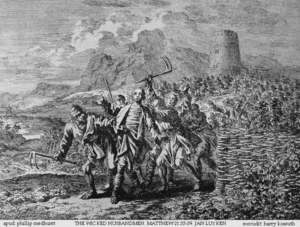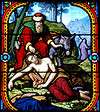Parable of the Wicked Husbandmen

The Parable of the Wicked Husbandmen is a parable of Jesus found in Matthew Matthew 21:33–46, Mark Mark 12:1–12, and Luke Luke 20:9–19, and in the non-canonical Gospel of Thomas. It describes a householder planting a vineyard and letting it out to husbandmen, who failed in their duties.
A common Christian interpretation is that this parable was about the chief priests and Pharisees and was given to the people present in the Temple during the final week before the death of Jesus. Muslim interpreters of the Bible considered this parable a clear prophecy of the advent of Muhammad.
The parable
33 Hear another parable: There was a certain householder, which planted a vineyard, and hedged it round about, and digged a winepress in it, and built a tower, and let it out to husbandmen, and went into a far country:
34 And when the time of the fruit drew near, he sent his servants to the husbandmen, that they might receive the fruits of it.
35 And the husbandmen took his servants, and beat one, and killed another, and stoned another.
36 Again, he sent other servants more than the first: and they did unto them likewise.
37 But last of all he sent unto them his son, saying, They will reverence my son.
38 But when the husbandmen saw the son, they said among themselves, This is the heir; come, let us kill him, and let us seize on his inheritance.
39 And they caught him, and cast him out of the vineyard, and slew him.
40 When the lord therefore of the vineyard cometh, what will he do unto those husbandmen?
41 They say unto him, He will miserably destroy those wicked men, and will let out his vineyard unto other husbandmen, which shall render him the fruits in their seasons.
42 Jesus saith unto them, Did ye never read in the scriptures, The stone which the builders rejected, the same is become the head of the corner: this is the Lord's doing, and it is marvellous in our eyes?
43 Therefore say I unto you, The kingdom of God shall be taken from you, and given to a nation bringing forth the fruits thereof.
44 And whosoever shall fall on this stone shall be broken: but on whomsoever it shall fall, it will grind him to powder.
45 And when the chief priests and Pharisees had heard his parables, they perceived that he spake of them.
46 But when they sought to lay hands on him, they feared the multitude – Matthew 21:33–46
Exegesis
The parable, according to the Q hypothesis, probably appeared first in Mark, then was copied and slightly altered by Matthew and Luke. Mark's source is in dispute, with the earliest tradition given by Papias as Mark's source being Peter. It is also found in the Gospel of Thomas as sayings 65–66, which some have suggested preceded the canonical Gospels, although its dating is still largely uncertain to scholars.
Here is the version of this parable that appears in Thomas (Patterson–Meyer Translation):
65. He said, "A [...] person owned a vineyard and rented it to some farmers, so they could work it and he could collect its crop from them. He sent his slave so the farmers would give him the vineyard's crop. They grabbed him, beat him, and almost killed him, and the slave returned and told his master. His master said, 'Perhaps he didn't know them.' He sent another slave, and the farmers beat that one as well. Then the master sent his son and said, 'Perhaps they'll show my son some respect.' Because the farmers knew that he was the heir to the vineyard, they grabbed him and killed him. Anyone here with two ears had better listen!"
66. Jesus said, "Show me the stone that the builders rejected: that is the keystone."
Verse 66 is a quote from Psalm 118:22–23. Many writers of the New Testament used this Psalm to sum up their understanding of Jesus' death as part of his role as the messiah.[1] It is notable that the Hebrew word for son, ben, is almost the same as stone, 'eben, which might be what generated seeing Jesus as a stone.[2] Since the synoptics state Jesus said this in the Temple, this could reflect their view of Jesus as replacing the function of the Temple, bringing God's presence to humanity.[3]
This could be seen as referring to the new Church's belief that they had superseded Judaism through Jesus' death, resurrection and role as the messiah. Others think it might be a reference to the Roman destruction of Jerusalem as seen by Christians as God's punishment for Jesus' death and their assumption that their new communities were the new Temple.
Seeing Jesus as a "stone" to build on precedes Jerusalem's destruction however. Paul, in his letter to the Romans chapter 9:33, refers to Jesus as a stone. Paul does not use the Psalms for his scriptural support but instead uses quotes from Isaiah 8:14 and 28:16. Luke stated, probably after Jerusalem's destruction, in Acts of the Apostles 4:11 that Peter used the same Psalm to describe Jesus shortly after Jesus' death. 1 Peter, which most scholars consider pseudepigraphal, uses both Isaiah and the Psalm as references in 2:6–8.
Matthew's version states the method of killing the third servant, stoning, which the other versions lack. Stoning might be a reference to Christian martyrs' deaths, perhaps the death of James the Just.[4] Matthew also has the priests say that the husbandmen should be thrown out, a joke on them when they later realize they are the husbandmen, although Mark and Luke have Jesus say that to them. Both Luke and Matthew have a statement about the stone's destructive power that Mark lacks.
Irenaeus used this parable to defend the link between Judaism's God and Jesus, in his Adversus Haereses.[5] If one sees the servants as the Jewish prophets, then the owner who sent them must then be the same father of the son in the story, who are God the Father and Jesus, so the God of the Jews must also be Jesus' father.
Interpretation

All the synoptic versions of the parable state that the priests of the Sanhedrin understood that Jesus' parable was directed against them, and thus that they are the husbandmen. The term husbandman is translated as tenant or farmer in the New International Version and as vine-grower in the New American Standard Bible. Workers often tended absentee estates and if the owner had no heirs the workers would have the first right to the land.[6]
The description of the vineyard is from Isaiah 5. Using a vineyard as a metaphor to describe Israel was a common practice for religious discourse at the time.[6] It could also be God's covenant, or perhaps the world itself.[7] The produce made at the vineyard might be a metaphor for all the good produced by the people, which the authorities are not sharing with God, and trying to keep for themselves.[8]
The owner of the vineyard is God and the son is Jesus. A common interpretation of the servants is that of the Jewish prophets, although they could be all of God's preceding messengers.[2] The meaning of the "others" who will be given the vineyard is debated. Some proposed interpretations have seen them as other Jews, or Christians, or maybe even the Jewish Christians.[8] They are usually seen as the new Christian community.[4]
Islamic view
Muslims read the parable of the tenants in the light of the following hadith:[9][10]
Narrated Abu Huraira:
Allah's Apostle said, "My similitude in comparison with the other prophets before me, is that of a man who has built a house nicely and beautifully, except for a place of one brick in a corner. The people go about it and wonder at its beauty, but say: 'Would that this brick be put in its place!' So I am that brick, and I am the Seal of the Prophets."[11]
The Quran addresses the Jews in many verses and blames them for killing the prophets of God:
Qur'an 2:91 And when it is said to them, "Believe in what Allah has revealed," they say, "We believe [only] in what was revealed to us." And they disbelieve in what came after it, while it is the truth confirming that which is with them. Say, "Then why did you kill the prophets of Allah before, if you are [indeed] believers?"[12]
Qur'an 2:87 And We did certainly give Moses the Torah and followed up after him with apostles. And We gave Jesus, the son of Mary, clear proofs and supported him with the Holy Spirit. But is it [not] that every time an apostle came to you, [O Children of Israel], with what your souls did not desire, you were arrogant? And a party [of apostles] you denied and another party you killed.[13]
Christians argue that the stone the builders rejected was Jesus himself. However, the fact is that Jesus was rejected by the tenants not by the builders.[9][14]
Muslim writers like Sami Ameri argued that the Greek word for wonderful (θαυμαστὴ) in Matthew 21:42 and Mark 12:11 has a similar meaning to the Arabic word for Ahmad in Qur'an 61:6.[15] Sami cites "the New Testament Greek Lexicon - King James Version" which translates (θαυμαστὴ) to "worthy of pious admiration";[16] in comparison to the meaning of the Arabic words Ahmad and Muhammad, "praiseworthy".[15]
See also
Notes
- ↑ Kilgallen 227
- 1 2 Brown et al. 621
- ↑ Brown et al. 713
- 1 2 Brown et al. 665
- ↑ Adversus Haereses, Book 4, Chapter 36
- 1 2 Kilgallen 225
- ↑ Irenaeus, Adversus Haereses Book IV, Chapter 36
- 1 2 Kilgallen 226
- 1 2 Rahmatullah Kairanawi, Izhar ul-Haq (Truth Revealed), Council of Senior Scholars (Saudi Arabia) 1989, p 1181
- ↑ Ali Ünal, 2013, chapter about the Parable of the tenants.
- ↑ Sahih al-Bukhari, Book of Virtues and Merits of the Prophet and his Companions, Chapter: The Seal of all the Prophets, Hadith number: 44
- ↑ http://quran.com/2/91
- ↑ http://quran.com/2/87
- ↑ Misha'al Abdullah, 1995, p 194
- 1 2 Sami Ameri, 2006, p 235
- ↑ http://www.biblestudytools.com/lexicons/greek/kjv/thaumastos.html
References
| Wikimedia Commons has media related to The Tenants in the Vineyard. |
- Brown, Raymond E. et al. The New Jerome Biblical Commentary Prentice Hall 1990 ISBN 978-0-13-614934-7
- Kilgallen, John J. A Brief Commentary on the Gospel of Mark Paulist Press 1989 ISBN 978-0-8091-3059-7
- Ameri, Sami. محمد رسول الله في الكتب المقدسة [Muhammad, the Apostle of God, in the Holy Scriptures of Judaism, Christianity, Zoroastrianism, Hinduism and Buddhism] (PDF) (in Arabic) (1st 2006 ed.). Tanweer Publishing center. ISBN 977-289-127-1.
- Abdullah, Misha'al. What Did Jesus Really Say? (PDF) (1995 ed.).
- Kairanawi, Rahmatullah. إظهار الحق [Izhar ul-Haq (Truth Revealed)] (PDF) (in Arabic) (1989 ed.). Council of Senior Scholars (Saudi Arabia).
- Ünal, Ali; Gültekin, Harun. The Prophet Promised In World Scriptures (2013 ed.). USA: Tughra Books. ISBN 978-1-59784-271-6.
